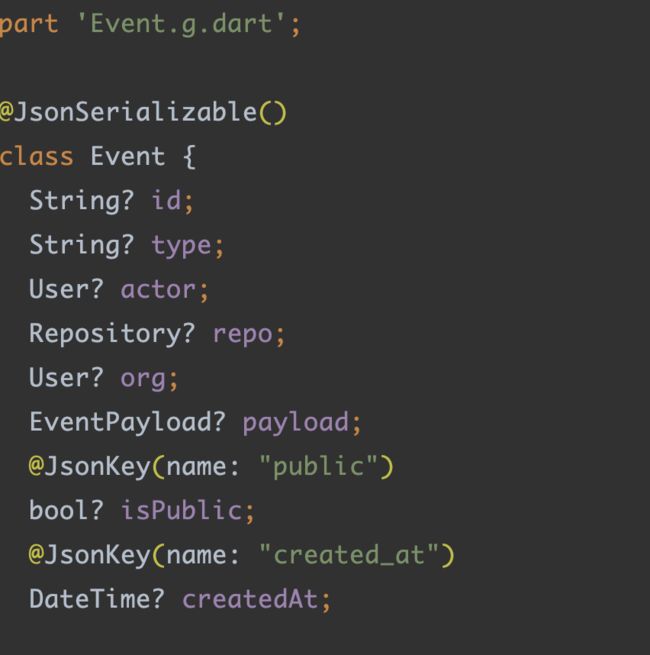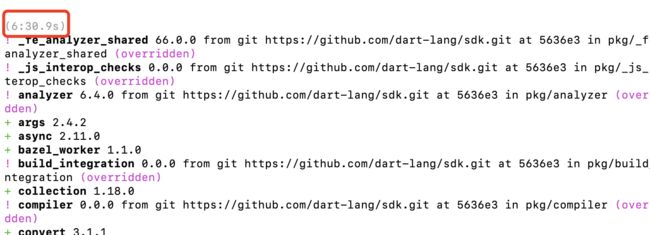2024 Flutter 重大更新,Dart 宏(Macros)编程开始支持,JSON 序列化有救
说起宏编程可能大家并不陌生,但是这对于 Flutter 和 Dart 开发者来说它一直是一个「遗憾」,这个「遗憾」体现在编辑过程的代码修改支持上,其中最典型的莫过于 Dart 的 JSON 序列化。
举个例子,目前 Dart 语言的 JSON 序列化高度依赖 build_runner 去生成 Dart 代码,例如在实际使用中我们需要:
- 依赖
json_serializable,通过注解声明一个Event对象 - 运行
flutter packages pub run build_runner build生成文件 - 得到
Event.g.dart文件,在项目中使用它去实现 JSON 的序列化和反序列化
 |
 |
|---|
这里最大的问题在于,我们需要通过命令行去生成一个项目文件,并且这个文件我们还可以随意手动修改,从开发角度来说,这并不优雅也不方便。
而宏声明是用户定义的 Dart 类,它可以实现一个或多个新的内置宏接口,Dart 中的宏是用正常的命令式 Dart 代码来开发,不存在单独的“宏语言”。
大多数宏并不是简单地从头开始生成新代码,而是根据程序的现有属性去添加代码,例如向 Class 添加 JSON 序列化的宏,可能会查看 Class 声明的字段,并从中合成一个
toJson(),将这些字段序列化为 JSON 对象。
我们首先看一段官方的 Demo , 如下代码所示,可以看到 :
MyState添加了一个自定义的@AutoDispose()注解,这是一个开发者自己实现的宏声明,并且继承了State对象,带有dispose方法。- 在
MyState里有多个a、a2、b和c三个对象,其中a、a2、b都实现了Disposable接口,都有dispose方法 - 虽然
a、a2、b和MyState的dispose();方法来自不同基类实现,但是基于@AutoDispose()的实现,在代码调用state.dispose();时,a、a2、b变量的dispose方法也会被同步调用
import 'package:macro_proposal/auto_dispose.dart';
void main() {
var state = MyState(a: ADisposable(), b: BDisposable(), c: 'hello world');
state.dispose();
}
()
class MyState extends State {
final ADisposable a;
final ADisposable? a2;
final BDisposable b;
final String c;
MyState({required this.a, this.a2, required this.b, required this.c});
String toString() => 'MyState!';
}
class State {
void dispose() {
print('disposing of $this');
}
}
class ADisposable implements Disposable {
void dispose() {
print('disposing of ADisposable');
}
}
class BDisposable implements Disposable {
void dispose() {
print('disposing of BDisposable');
}
}
如下图所示,可以看到,尽管 MyState 没用主动调用 a 、a2 、b 变量的 dispose 方法,并且它们和 MyState 的 dispose 也来自不同基类,但是最终执行所有 dispose 方法都被成功调用,这就是@AutoDispose() 的宏声明实现在编译时对代码进行了调整。
如下图所示是 @AutoDispose() 的宏编程实现,其中 macro 就是一个标志性的宏关键字,剩下的代码可以看到基本就是 dart 脚本的实现, macro 里主要是实现 ClassDeclarationsMacro 和buildDeclarationsForClass方法,如下代码可以很直观看到关于 super.dispose(); 和 disposeCalls 的相关实现。
import 'package:_fe_analyzer_shared/src/macros/api.dart';
// Interface for disposable things.
abstract class Disposable {
void dispose();
}
macro class AutoDispose implements ClassDeclarationsMacro, ClassDefinitionMacro {
const AutoDispose();
void buildDeclarationsForClass(
ClassDeclaration clazz, MemberDeclarationBuilder builder) async {
var methods = await builder.methodsOf(clazz);
if (methods.any((d) => d.identifier.name == 'dispose')) {
// Don't need to add the dispose method, it already exists.
return;
}
builder.declareInType(DeclarationCode.fromParts([
// TODO: Remove external once the CFE supports it.
'external void dispose();',
]));
}
Future<void> buildDefinitionForClass(
ClassDeclaration clazz, TypeDefinitionBuilder builder) async {
var disposableIdentifier =
// ignore: deprecated_member_use
await builder.resolveIdentifier(
Uri.parse('package:macro_proposal/auto_dispose.dart'),
'Disposable');
var disposableType = await builder
.resolve(NamedTypeAnnotationCode(name: disposableIdentifier));
var disposeCalls = <Code>[];
var fields = await builder.fieldsOf(clazz);
for (var field in fields) {
var type = await builder.resolve(field.type.code);
if (!await type.isSubtypeOf(disposableType)) continue;
disposeCalls.add(RawCode.fromParts([
'\n',
field.identifier,
if (field.type.isNullable) '?',
'.dispose();',
]));
}
// Augment the dispose method by injecting all the new dispose calls after
// either a call to `augmented()` or `super.dispose()`, depending on if
// there already is an existing body to call.
//
// If there was an existing body, it is responsible for calling
// `super.dispose()`.
var disposeMethod = (await builder.methodsOf(clazz))
.firstWhere((method) => method.identifier.name == 'dispose');
var disposeBuilder = await builder.buildMethod(disposeMethod.identifier);
disposeBuilder.augment(FunctionBodyCode.fromParts([
'{\n',
if (disposeMethod.hasExternal || !disposeMethod.hasBody)
'super.dispose();'
else
'augmented();',
...disposeCalls,
'}',
]));
}
}
到这里大家应该可以直观感受到宏编程的魅力,上述 Demo 来自 dart-language 的 macros/example/auto_dispose_main ,其中 bin/ 目录下的代码是运行的脚本示例,lib/ 目录下的代码是宏编程实现的示例:
https://github.com/dart-lang/language/tree/main/working/macros/example
当然,因为现在是实验性阶段,API 和稳定性还有待商榷,所以想运行这些 Demo 还需要一些额外的处理,比如版本强关联,例如上述的 auto_dispose_main 例子:
-
需要 dart sdk 3.4.0-97.0.dev ,目前你可以通过 master 分支下载这个 dark-sdk https://storage.googleapis.com/dart-archive/channels/main/raw/latest/sdk/dartsdk-macos-arm64-release.zip
-
将 sdk 配置到环境变量,或者进入到 dart sdk 的 bin 目录执行 ./dart --version 检查版本
-
进入上诉的 example 下执行 dart pub get,过程可能会有点长
-
最后,执行
dart --enable-experiment=macros bin/auto_dispose_main.dart,记得这个 dart 是你指定版本的 dart 。
另外,还有一个第三方例子是来自 millsteed 的 macros ,这是一个简单的 JSON 序列化实现 Demo ,并且可以直接不用额外下载 dark-sdk,通过某个 flutter 内置 dart-sdk 版本就可以满足条件:3.19.0-12.0.pre :
在本地 Flutter 目录下,切换到
git checkout 3.19.0-12.0.pre,然后执行 flutter doctor 初始化 dark sdk 即可。
代码的实现很简单,首先看 bin 下的示例,通过 @Model() 将 GetUsersResponse 和 User 声明为 JSON 对象,然后在运行时,宏编程会自动添加 fromJson 和 toJson 方式。
import 'dart:convert';
import 'package:macros/model.dart';
()
class User {
User({
required this.username,
required this.password,
});
final String username;
final String password;
}
()
class GetUsersResponse {
GetUsersResponse({
required this.users,
required this.pageNumber,
required this.pageSize,
});
final List<User> users;
final int pageNumber;
final int pageSize;
}
void main() {
const body = '''
{
"users": [
{
"username": "ramon",
"password": "12345678"
}
],
"pageNumber": 1,
"pageSize": 30
}
''';
final json = jsonDecode(body) as Map<String, dynamic>;
final response = GetUsersResponse.fromJson(json);
final ramon = response.users.first;
final millsteed = ramon.copyWith(username: 'millsteed', password: '87654321');
final newResponse = response.copyWith(users: [...response.users, millsteed]);
print(const JsonEncoder.withIndent(' ').convert(newResponse));
}
而 Model 的宏实现就相对复杂一些,但是实际上就是将类似 freezed/ json_serializable 是实现调整到宏实现了,而最终效果就是,开发者使用起来更加优雅了。
// ignore_for_file: depend_on_referenced_packages, implementation_imports
import 'dart:async';
import 'package:_fe_analyzer_shared/src/macros/api.dart';
macro class Model implements ClassDeclarationsMacro {
const Model();
static const _baseTypes = ['bool', 'double', 'int', 'num', 'String'];
static const _collectionTypes = ['List'];
Future<void> buildDeclarationsForClass(
ClassDeclaration classDeclaration,
MemberDeclarationBuilder builder,
) async {
final className = classDeclaration.identifier.name;
final fields = await builder.fieldsOf(classDeclaration);
final fieldNames = <String>[];
final fieldTypes = <String, String>{};
final fieldGenerics = <String, List<String>>{};
for (final field in fields) {
final fieldName = field.identifier.name;
fieldNames.add(fieldName);
final fieldType = (field.type.code as NamedTypeAnnotationCode).name.name;
fieldTypes[fieldName] = fieldType;
if (_collectionTypes.contains(fieldType)) {
final generics = (field.type.code as NamedTypeAnnotationCode)
.typeArguments
.map((e) => (e as NamedTypeAnnotationCode).name.name)
.toList();
fieldGenerics[fieldName] = generics;
}
}
final fieldTypesWithGenerics = fieldTypes.map(
(name, type) {
final generics = fieldGenerics[name];
return MapEntry(
name,
generics == null ? type : '$type<${generics.join(', ')}>',
);
},
);
_buildFromJson(builder, className, fieldNames, fieldTypes, fieldGenerics);
_buildToJson(builder, fieldNames, fieldTypes);
_buildCopyWith(builder, className, fieldNames, fieldTypesWithGenerics);
_buildToString(builder, className, fieldNames);
_buildEquals(builder, className, fieldNames);
_buildHashCode(builder, fieldNames);
}
void _buildFromJson(
MemberDeclarationBuilder builder,
String className,
List<String> fieldNames,
Map<String, String> fieldTypes,
Map<String, List<String>> fieldGenerics,
) {
final code = [
'factory $className.fromJson(Map json) {' .indent(2),
'return $className('.indent(4),
for (final fieldName in fieldNames) ...[
if (_baseTypes.contains(fieldTypes[fieldName])) ...[
"$fieldName: json['$fieldName'] as ${fieldTypes[fieldName]},"
.indent(6),
] else if (_collectionTypes.contains(fieldTypes[fieldName])) ...[
"$fieldName: (json['$fieldName'] as List)" .indent(6),
'.whereType>()' .indent(10),
'.map(${fieldGenerics[fieldName]?.first}.fromJson)'.indent(10),
'.toList(),'.indent(10),
] else ...[
'$fieldName: ${fieldTypes[fieldName]}'
".fromJson(json['$fieldName'] "
'as Map),'
.indent(6),
],
],
');'.indent(4),
'}'.indent(2),
].join('\n');
builder.declareInType(DeclarationCode.fromString(code));
}
void _buildToJson(
MemberDeclarationBuilder builder,
List<String> fieldNames,
Map<String, String> fieldTypes,
) {
final code = [
'Map toJson() {' .indent(2),
'return {'.indent(4),
for (final fieldName in fieldNames) ...[
if (_baseTypes.contains(fieldTypes[fieldName])) ...[
"'$fieldName': $fieldName,".indent(6),
] else if (_collectionTypes.contains(fieldTypes[fieldName])) ...[
"'$fieldName': $fieldName.map((e) => e.toJson()).toList(),".indent(6),
] else ...[
"'$fieldName': $fieldName.toJson(),".indent(6),
],
],
'};'.indent(4),
'}'.indent(2),
].join('\n');
builder.declareInType(DeclarationCode.fromString(code));
}
void _buildCopyWith(
MemberDeclarationBuilder builder,
String className,
List<String> fieldNames,
Map<String, String> fieldTypes,
) {
final code = [
'$className copyWith({'.indent(2),
for (final fieldName in fieldNames) ...[
'${fieldTypes[fieldName]}? $fieldName,'.indent(4),
],
'}) {'.indent(2),
'return $className('.indent(4),
for (final fieldName in fieldNames) ...[
'$fieldName: $fieldName ?? this.$fieldName,'.indent(6),
],
');'.indent(4),
'}'.indent(2),
].join('\n');
builder.declareInType(DeclarationCode.fromString(code));
}
void _buildToString(
MemberDeclarationBuilder builder,
String className,
List<String> fieldNames,
) {
final code = [
'@override'.indent(2),
'String toString() {'.indent(2),
"return '$className('".indent(4),
for (final fieldName in fieldNames) ...[
if (fieldName != fieldNames.last) ...[
"'$fieldName: \$$fieldName, '".indent(8),
] else ...[
"'$fieldName: \$$fieldName'".indent(8),
],
],
"')';".indent(8),
'}'.indent(2),
].join('\n');
builder.declareInType(DeclarationCode.fromString(code));
}
void _buildEquals(
MemberDeclarationBuilder builder,
String className,
List<String> fieldNames,
) {
final code = [
'@override'.indent(2),
'bool operator ==(Object other) {'.indent(2),
'return other is $className &&'.indent(4),
'runtimeType == other.runtimeType &&'.indent(8),
for (final fieldName in fieldNames) ...[
if (fieldName != fieldNames.last) ...[
'$fieldName == other.$fieldName &&'.indent(8),
] else ...[
'$fieldName == other.$fieldName;'.indent(8),
],
],
'}'.indent(2),
].join('\n');
builder.declareInType(DeclarationCode.fromString(code));
}
void _buildHashCode(
MemberDeclarationBuilder builder,
List<String> fieldNames,
) {
final code = [
'@override'.indent(2),
'int get hashCode {'.indent(2),
'return Object.hash('.indent(4),
'runtimeType,'.indent(6),
for (final fieldName in fieldNames) ...[
'$fieldName,'.indent(6),
],
');'.indent(4),
'}'.indent(2),
].join('\n');
builder.declareInType(DeclarationCode.fromString(code));
}
}
extension on String {
String indent(int length) {
final space = StringBuffer();
for (var i = 0; i < length; i++) {
space.write(' ');
}
return '$space$this';
}
}
目前宏还处于试验性质的阶段,所以 API 还在调整,这也是为什么上面的例子需要指定 dart 版本的原因,另外宏目前规划里还有一些要求,例如
- 所有宏构造函数都必须标记为
const - 所有宏必须至少实现其中一个
Macro接口 - 宏不能是抽象对象
- 宏 class 不能由其他宏生成
- 宏 class 不能包含泛型类型参数
- 每个宏接口都需要声明宏类必须实现的方法,例如,在声明阶段应用的
ClassDeclarationsMacro及其buildDeclarationsForClass方法。
未来规划里,宏 API 可能会作为 Pub 包提供,通过库 dart:_macros 来提供支持 ,具体还要等正式发布时 dart 团队的决策。
总的来说,这对于 dart 和 flutter 是一个重大的厉害消息,虽然宏编程并不是什么新鲜概念,该是 dart 终于可以优雅地实现 JSON 序列化,并且还是用 dart 来实现,这对于 flutter 开发者来说,无疑是最好的新年礼物。
所以,新年快乐~我们节后再见~


